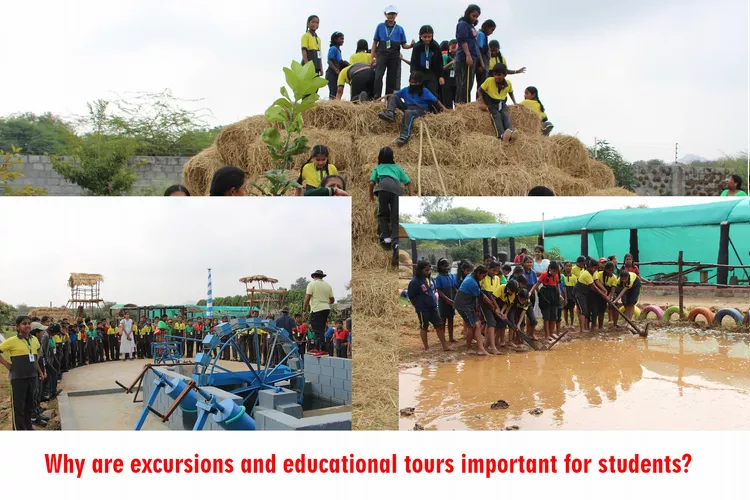Children have an inquisitive mind which allows them to be more imaginative, and retain more information by visually experiencing the activities in a chosen environment.
Since they don’t have any preconceived notions about how an experience should be, they’re able to experience places, and settings in a very different way compared to adults. Educational tours are regularly organised by CBSE boarding schools of Warangal to help students to explore more and dig deeper into concepts and theories.
To delve into the concepts and have a thorough understanding, students require exposure, knowledge, and awareness of the subjects in a practical way. This can be accomplished through Educational Tours. Schools should include educational trips as part of the curriculum as they provide students the joy to discover new opportunities, places and and learn about the world they live in. Educational tours are a great way for students to interact, experience and grasp theory practically. Such trips benefit students and teachers too.
When students are exposed to newer environments, their minds automatically go in different directions, allowing them to raise queries that they may not have previously considered. An educational tour, apart from helping teachers witness student behaviours and tendencies, also provides insights on what kind of stimulation works for students, and can accordingly adjust their lesson plans and teaching based on visual cues. By conducting quizzes on the field, students get a chance to sharpen their observation skills, evaluate information in a new context and most importantly, engage with a place and subject with different sensory input.
The benefits of excursions and educational tours are:
1. Interactive Learning:
During an excursion, students get a chance to interact with what they are learning or have learned. Students can participate in the theories and concepts practically and the experience is not just limited to reading about the subject. Educational tours provide valuable educational opportunities without a regular classroom, textbooks, and other tools. When they get a chance to see, touch and experience things that they have learned about in books, students return to the classroom with greater enthusiasm, motivation, and a deeper connection with the subject. On an educational tour, students get to experience different methods and approaches to teaching and gain a new perspective of seeing the subject.
2. Cultural Observations:
On a good educational tour, students witness different cultural practices and norms through their eyes. institutions like the Delhi Public School Warangal organise these educational tours, CSR activities, and community-based activities which expose kids to how local people from different socioeconomic levels live. Such experiences encourage students to develop compassion and empathy for people from different cultures and lifestyles. It inspires students to work toward change when the issues reflect on how it affects and challenges people facing them.
3. Social Interaction:
Educational trips provide an opportunity for kids to spend time with each other in a different environment. They discuss their experiences which help them connect more. An educational tour places the students in different socio-cultural environments where they encounter new people and witness regional practices. These interactions teach them to accept diversity. Thus, enhancing their communication skills, sense of teamwork, and building a community among students. This allows them to develop unbiased opinions and learn from strangers. Such excursions aid in developing students who are both intelligent and observant in applying their learning toward helping people around them. In this digital age, learning in context helps students develop better social cues which is a skill beyond textbooks and screens.
4. Environmental Awareness:
Educational tours often take students to various locations, including natural settings and ecosystems like parks and nature spots, to help students see how amazing and important our environment is. They can learn about taking care of nature and making sure it lasts for a long time. Being in different landscapes helps them understand how people’s actions affect nature. This makes them feel like they should do things to help, like using less plastic or planting trees and making informed decisions to contribute positively to the planet.
Educational tours play a key role in shaping the overall growth of students. They go beyond regular studies, letting students learn in a fun way. These trips teach them about different cultures, help them make friends, and show them how to take care of our environment. So, besides gaining knowledge, students not only deepen their understanding of subjects but also cultivate empathy, communication skills, and a sense of responsibility towards the world around them.


